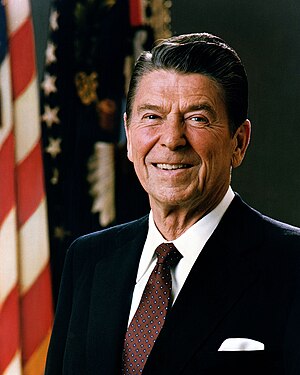Ronald Reagan

Relevance
Mentioned In
Wikipedia Information
 |
Ronald Wilson Reagan (February 6, 1911 – June 5, 2004) was an American politician and actor who served as the 40th president of the United States from 1981 to 1989. He was a member of the Republican Party and became an important figure in the American conservative movement. His presidency is known as the Reagan era. Born in Illinois, Reagan graduated from Eureka College in 1932 and was hired the next year as a sports broadcaster in Iowa. In 1937, he moved to California where he became a well-known film actor. During his acting career, Reagan was president of the Screen Actors Guild twice, from 1947 to 1952 and from 1959 to 1960. In the 1950s, he hosted General Electric Theater and worked as a motivational speaker for General Electric. Reagan's "A Time for Choosing" speech during the 1964 presidential election launched his rise as a leading conservative figure. After being elected governor of California in 1966, he raised state taxes, turned the state budget deficit into a surplus and implemented harsh crackdowns on university protests. Following his loss to Gerald Ford in the 1976 Republican Party presidential primaries, Reagan won the Republican Party's nomination and then a landslide victory over President Jimmy Carter in the 1980 presidential election. In his first term as president, Reagan began implementing "Reaganomics", which involved economic deregulation and cuts in both taxes and government spending during a period of stagflation. On the world stage, he escalated the arms race, increased military spending, transitioned Cold War policy away from the policies of détente with the Soviet Union, and ordered the 1983 invasion of Grenada. He also survived an assassination attempt, fought public-sector labor unions, expanded the war on drugs, and was slow to respond to the AIDS epidemic. In the 1984 presidential election, he defeated former vice president Walter Mondale in another landslide victory. Foreign affairs dominated Reagan's second term, including the 1986 bombing of Libya, the secret and illegal sale of arms to Iran to fund the Contras, and engaging in negotiations with Soviet leader Mikhail Gorbachev, which culminated in the Intermediate-Range Nuclear Forces Treaty. Reagan left the presidency in 1989 with the American economy having seen a significant reduction of inflation, the unemployment rate having fallen, and the U.S. having entered its then-longest peacetime expansion. At the same time, the national debt had nearly tripled since 1981 as a result of his tax cuts and increased military spending, despite cuts to domestic discretionary spending. Reagan's foreign policies also contributed to the end of the Cold War. Though he planned an active post-presidency, it was hindered, after he was diagnosed with Alzheimer's disease in 1994, and his physical and mental capacities gradually deteriorated, leading to his death in 2004. His tenure constituted a realignment toward conservative policies in the United States, and he is often considered an icon of American conservatism. Historical rankings of U.S. presidents have typically placed Reagan in the upper tier, and his post-presidential approval ratings by the general public are usually high.